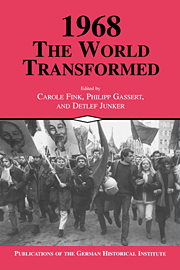Book contents
- Frontmatter
- Introduction
- Part One Tet and Prague: The Bipolar System in Crisis
- 1 Tet and the Crisis of Hegemony
- 2 Tet on TV
- 3 The American Economic Consequences of 1968
- 4 The Czechoslovak Crisis and the Brezhnev Doctrine
- 5 Ostpolitik: The Role of the Federal Republic of Germany in the Process of Détente
- 6 China Under Siege
- Part Two From Chicago to Beijing: Challenges to the Domestic Order
- Part Three “Ask the Impossible!”: Protest Movements of 1968
- Epilogue
- Index
4 - The Czechoslovak Crisis and the Brezhnev Doctrine
Published online by Cambridge University Press: 05 January 2013
- Frontmatter
- Introduction
- Part One Tet and Prague: The Bipolar System in Crisis
- 1 Tet and the Crisis of Hegemony
- 2 Tet on TV
- 3 The American Economic Consequences of 1968
- 4 The Czechoslovak Crisis and the Brezhnev Doctrine
- 5 Ostpolitik: The Role of the Federal Republic of Germany in the Process of Détente
- 6 China Under Siege
- Part Two From Chicago to Beijing: Challenges to the Domestic Order
- Part Three “Ask the Impossible!”: Protest Movements of 1968
- Epilogue
- Index
Summary
Until the late 1980s, the Soviet Unions determination to preserve Communism in East-Central Europe was not in doubt. When Communist regimes in Eastern Europe came under violent threat in the 1950s - in East Germany in 1953 and in Hungary in 1956 - Soviet troops intervened to subdue those challenges. A very different problem arose in 1968, when Czechoslovakia embarked on a dramatic, but entirely peaceful, attempt to change both the internal complexion of Communism and many of the basic structures of Soviet-Eastern European relations. This eight-month long experiment, widely known as the “Prague Spring,” came to a decisive end in August 1968 when hundreds of thousands of Soviet and Warsaw Pact soldiers invaded Czechoslovakia.
Neither the Soviet Union nor Czechoslovakia exists any longer, but the legacy of the Prague Spring and the Soviet invasion is still being felt. The reforms that took place in Czechoslovakia in 1968 under the leadership of Alexander Dubcek offered the first opportunity for an Eastern European Communist regime to earn genuine popular support. Moscow's unwillingness to tolerate those reforms ensured that, from then on, stability in the Eastern bloc could be preserved only by the threat of another Soviet invasion. That threat sufficed to hold the bloc together for more than twenty years, even when tested by severe crises like the one in Poland in 1980-1. But soon after Mikhail Gorbachev became head of the Soviet Communist Party (CPSU) and was no longer willing to use military force in Eastern Europe, the whole Soviet bloc collapsed. Because of the legacy of 1968, all Eastern European regimes lacked the legitimacy they would have needed to sustain themselves without Soviet military backing. The invasion of Czechoslovakia saved Soviet-style Communism in Eastern Europe temporarily, but it helped guarantee the system's ultimate demise.
- Type
- Chapter
- Information
- 1968: The World Transformed , pp. 111 - 172Publisher: Cambridge University PressPrint publication year: 1998
- 2
- Cited by

